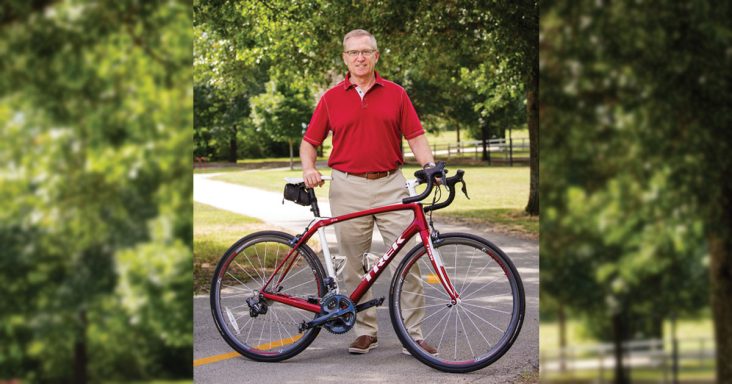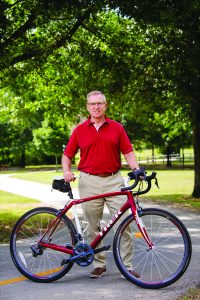Jeff Long talks family, the Greenway and the changing landscape of college athletics
by July 1, 2024 3:53 pm 2,145 views

A familiar face might have caught your eye during the past year if you frequent the Razorback Greenway. If you’re a dyed-in-the-wool Razorback fan, and you’ve ever spotted a cyclist and wondered, ‘Could that be Jeff Long?’ you might have been onto something.
“I ride it three or four times a week,” Long said during a recent interview. “Sometimes more.”
At 64, Long’s daily rides typically span 25 to 40 miles. However, there’s a unique tradition he upholds on his birthday. For the past few years, he’s made it a point to cycle his age when the big day rolls around in September.
“I love the Greenway,” he said. “I do get out on the roads outside of town less often, but I enjoy that as well if I know where I’m going and don’t get lost.”
Like the 40-mile Greenway that passes through Northwest Arkansas from Fayetteville to Bella Vista, it’s been a winding road for Long the past few years. A road that quietly led the former University of Arkansas athletics director back to Northwest Arkansas one year ago.
“I loved it here,” he said. “I often tell people I would never have left if they didn’t ask me to leave. I say that jokingly, of course, but this was home.”
A DECADE IN FAYETTEVILLE
An Ohio native, Long was a coach and college athletics administrator at the NCAA Division I level for four decades. He spent nearly 25 years as an administrator, with jobs in each of the country’s so-called “Power 5” conferences (Big 12, Big Ten, Big East, ACC and SEC). Arguably, the most high-profile was a decade (2008-2017) at the UA as the successor to longtime athletic director Frank Broyles.

There was also the Bobby Petrino saga. Long was praised for hiring the football coach in 2008 and decisively firing him in 2012 following Petrino’s affair with an athletic department staff member. But Petrino was successful, with a 34-17 record before his abrupt departure. That included an 11-2 record in his final season. It was just the third 11-win season in Arkansas football history and the first since 1977.
Ironically, Petrino returned to Northwest Arkansas last year, too. Head coach Sam Pittman hired Petrino as the Razorbacks’ offensive coordinator this past November.
“I’ve never carried any ill will towards coach Petrino,” Long said. “Given the past, for him to return to Arkansas says a lot about him that he was willing to take that position. I think he’s an excellent football coach. I remain a fan of the Razorbacks and watch them at every opportunity. I wish them all the best.”
Long, who chaired the inaugural College Football Playoff selection committee for 2014 and 2015 and remained a member of the committee through 2017, said it’s challenging to encapsulate his decade in Fayetteville into a succinct summary. He has specific memories of numerous highlight-reel athletic moments and championships and can also rattle off the department’s academic achievements. Classroom success has always been a priority, though he wonders where its importance lies in the rapidly-evolving world of college athletics, which has seen seismic shifts in recent months and years.
“The business model has changed,” he said. “The model I worked in for decades was one I valued — educating our student-athletes. That will still be there, but it’s not the most prominent piece of what is happening now in college athletics. It’s about generating revenue and sharing that revenue with student-athletes. There is a lot of change yet to come. There is going to be a model of revenue-sharing with student-athletes. It will be choppy, at best, until we get there, but that’s coming. The sooner we get there, the better it will become for athletic administration and how they should move forward.”
A RETURN TO NWA
Long’s tenure as Razorbacks athletics director was the longest job of his career. Although it ended on a sour note, he landed a year later in Lawrence, Kan., as the athletics director at the University of Kansas (2018-2021). He stepped down shortly after KU dismissed football coach Les Miles due to allegations of inappropriate behavior toward female students at LSU. Long hired Miles as KU’s coach in 2018.
Suddenly unbound by geographic limitations, Long and his wife Fanny headed east.
“I’ve dragged my wife all over the country,” Long joked.
He and Fanny were married in 1992 and celebrated their 25th wedding anniversary on Aug. 1, 2017, by renewing their vows in a private ceremony at Thorncrown Chapel near Eureka Springs.
“When we were out [at Kansas], I asked her where she would like to live. She has always wanted to live near her sister, and her sister was residing in North Carolina. So, we moved to Bermuda Run, N.C.”
After two years there, he and Fanny reached a family-driven decision to move back to Northwest Arkansas in June 2023. Despite how his UA tenure ended, Long said the region always held a special place for him.
“We raised our children here,” he recalled. “When we came, Christina was in the third grade, and Stephanie was in the eighth. Fanny and I always had a goal of being somewhere where we could have our children go through high school and have a home, and we were able to do that in Arkansas. Blessed is an overused term, but we feel blessed that we were able to do that in the industry that I worked in because it is so volatile and unpredictable.”
Initially, Long’s move back was only temporary, so he and Fanny could be near their oldest daughter, who lived in Northwest Arkansas and was expecting her first child. After a few months, they decided it should become permanent and bought a house.
“We rented an Airbnb for three months, and I was looking forward to returning and reconnecting with friends and family here,” Long said. “During the stay, it came to both of us that we should be here. We both were unsure [upon moving back] if it would be the Northwest Arkansas we remembered five years ago. But it was, and more. It was an easy decision for us to move back here.”
NOT DONE WORKING
Long said being a grandparent is as incredible as it sounds. He also enjoys being part of his adult daughters’ lives. Stephanie (Long) Gannon, the oldest, earned four University of Arkansas degrees — including a doctorate in cognitive neuroscience — and works for Walmart Global Technology.
Christina Long, a graduate of the prestigious Missouri School of Journalism, is the managing editor of Hawgs Illustrated, a magazine covering the Arkansas Razorbacks.
“Seeing them achieve as adult women is awesome,” Long said. “They are both strong, independent women; I give most of the credit to my wife. She raised them while I was doing the athletics thing. But it’s deeply personal for me, and it’s a gratifying feeling to be around my adult children and see them succeed and begin families and things like that.”
As much as he loves his family, being a grandfather and riding bicycles, Long said he doesn’t think he’s done working. He is a senior consultant for two companies: Trenchcoat Advisors, a risk management firm based in Washington, D.C., and Independent Sports & Entertainment (ISE), a representation, management and marketing agency based in Los Angeles that’s doing more in the collegiate naming rights business.
“On one side [Trenchcoat], I’m trying to help athletics directors, athletic departments and universities protect themselves,” Long said. “And on the other side [ISE], we’re trying to make some money that they desperately need given the [House v. NCAA] settlement and all the things coming down with student-athletes and potential employment.
“I don’t think about retirement. That’s why I do the consulting things, because I need activity. I need energy. I feel healthy, and I feel my cognitive abilities are still strong. So, I don’t think this is retirement. However, I don’t know if I would accept a position as a leader of an intercollegiate athletic program at this point in the industry and in my life.”
